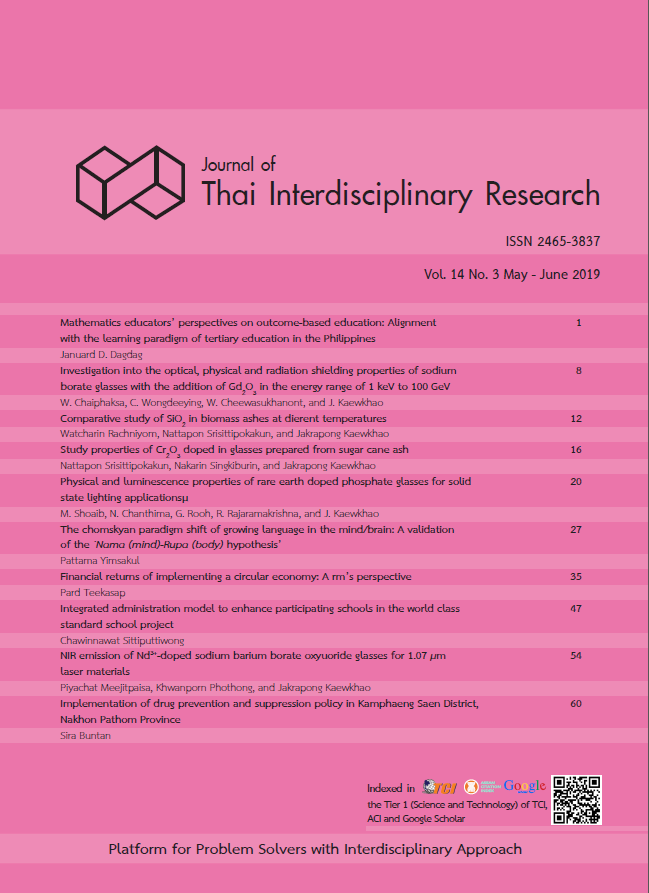Mathematics educators’ perspectives on outcome-based education: Alignment with the learning paradigm of tertiary education in the Philippines
Main Article Content
Abstract
This study utilized a mixed methods research approach to explore the perspectives of Mathematics educators about Outcome Based Education, or OBE, in Isabela, Phillipines. Forty-seven educators from twenty-two higher education institutions were selected. Data was gathered from true-false and open questions, personal interviews and the review of documents. Descriptive statistical and thematic analysis was used on these data sources. The findings of the research revealed that most of educators that took part in the research did not have sucient knowledge about OBE. This let to them failing to comply with the OBE premises and principles. The perspectives and attitudes of the educators also showed that they could not currently get away from using conventional non-outcome-based practices. They therefore find it dicult to constructively align the curriculum and assessment in their courses with the attainment of desired outcomes for their students. A training program was designed as part of this research to overcome these issues.
Article Details
References
J. S. Hilario, Using outcomes-based education (OBE) in the teaching and learning of community and public health with related learning experience, Asian Journal of Educational Research 3(2015) 46-56.
A.D. Abad, ASEAN 2015: Philippine education’s boon or bane?, 10th CODEB IV-A annual conference (2014).
CHED Memorandum Order (CMO) No. 46, Series of 2012. Policy Standards to Enhance Quality Assurance (QA) in Philippine Higher Education Through Outcomes-based and Typology-based QA. Available from: http://www.ched.gov.ph/wp-content/uploads/2013/07/CMO-No.46-s2012.pdf
Commission on Higher Education (CHED) Strategic Plan for 2011-2016. Available from: https://ched.gov.ph/wp-content/uploads/2017/08/CHED-Strategic-Plan-2011-2016.pdf
Guidelines for the Implementation of CMO 46 Series of 2012 on the Policy Standard to Enhance Quality Assurance (QA) in Philippine Higher Education through Outcomes-based and Typology-based QA. Available from: https://ched.gov.ph/wp-content/uploads/2017/10/CMO-No.46-s2012.pdf
Commission on Higher Education. Handbook on Typology, Outcomes-based Education, and Institutional Sustainable Assessment; 2014. Available from: http://www.ched.gov.ph/wp-content/uploads/2014/06/Handbook%20on%20Typology%20Outcomes.pdf
M. H. Davis, Outcomes-based education. Journal of Veterenary Medical Education 30 (2003) 227-232.
R. Killen, Outcomes-based education: Principles and possibilities. University of Newcastle, Faculty of Education; (2000).
J. Biggs, C. Tang, Teaching for quality learning at university. 3rd ed. Society for Research into Higher Education. McGraw-Hill (2007).
A. M. Morcke, T. Dorman, B. Eika, Outcome (competency) based education: an exploration of its origin, theoretical basis and empirical evidence. Advances in Health Science Education 18 (2013) 851-863.
A. C. Nicholson, Comparison of selected outcomes based on teaching strategies that promote active learning in nursing education. PhD (Doctor of Philosophy) Thesis, University of Iowa (2010).
M. J. Lawson, H. Williams, Outcomes-based education. Discussion Paper Prepared for the Association of Independent Schools of SA; (2007).
J. M. Laguador, C. I. Dotong, Knowledge versus practice on the outcomes-based education implementation of the Engineering Faculty Members in LPU. International Journal of Academic Research in Progressive Education and Development 3 (2014) 64-74.
B. Malan, The New Paradigm of Outcomes-based Education in Perspectives. Tydskrif vir Verbruikerwetenskappe 28 (2000) 22-28.
G. Lui, C. Shum, Outcome-based education and student learning in Managerial Accounting in Hong Kong. Journal of Case Studies in Accreditation and Assessment 2 (2012) 1-13.
I. L. An, Impact of Outcome-Based Education Instruction to Accountancy Students in an Asian University. Asia Pacific Journal of Education, Arts and Sciences 1 (2014) 48-52.
W. Spady, Outcome-based education: Critical issues and answers. Arlington, VA: American Association of School Administrators (1994) Available from: https://files.eric.ed.gov/fulltext/ED380910.pdf
W. Spady, A. Schlebusch, Curriculum 2005: A Guide for Parents. Cape Town Renaissance; (1999).
M. B. Butler, Outcomes based/focused education overview, Education Department of Western Australia (2004). Available from https://studylib.net/doc/5832739/outcomes-based-education--obe-
N. J. Ramoroka, Educators' understanding of the premises underpinning outcomes-based education and its impact in their classroom practices. University of Pretoria (2007). Available from: http://www.archive.jfn.ac.lk/OBESCL/MOHE/OBE-Articles/Books-chapters-n-Reports/1.Assessment-n-QA.pdf
C. Acharya, Outcome-based education (OBE): A new paradigm for learning, Triannual Newsletter produced by the Centre for Development of Teaching and Learning 7 (2003).
W. Spady, K. J. Marshall, Beyond traditional outcomes-based education. Educational Leadership 49 (1991) 67-72.
R. Berlach, Outcomes-based education and the death of knowledge. Conference of the Australian Association for Research in Education. The University of Melbourne, Victoria, Australia. Available from: http://www.aare.Edu.au/04pap/ber04768.pdf
D. N. Wijayanti, Cognitivism theory of language teaching and learning [Internet]. Mydreamarea; 2003 [cited 16 January 2018]. Available from: https://mydreamarea.wordpress.com/2013/01/05/cognitivism-theory-of-language-teaching-and-learning/
SEI-DOST, MATHTED. Framework for Philippine mathematics teacher education. Manila: SEI-DOST, MATHTED; 2011 Available from: http://www.sei.dost.gov.ph/images/downloads/publ/sei_mathteach.pdf
P. Norman,Outcomes-based education: A PNG perspective. Contemporary PNG Studies: DWU Research Journal 5 (2006) 45-57.
R. B. Barr, J. Tagg, From teaching to learning: A new paradigm for undergraduate education. Change (1995) 12-25. Available from http://docushare3.dcc.edu/docushare/dsweb/Get/Version-3000/BarrTagg.pdf
J. D. Dagdag, R. S. Cardona, Perspectives and practices on outcomes-based assessment (OBA) among College Mathematics Educators in Northeastern Luzon Philippines, Asia Pacific Journal of Multidisciplinary Research 6 (2018) 18-25.
J. R. Fraenkel, N. E. Wallen, How to design and evaluate research in education (7th ed). McGraw-Hill Higher Education. New York (2009).
J. Biggs, C. Tang, Applying constructive alignment to outcomes-based teaching and learning (2009).
M. Schwartz, Matching assessments to learning outcomes, The Learning & Teaching Office. Available from: https://www.ryerson.ca/content/dam/lt/resources/handouts/examslearningoutcomes.pdf
J. B. Caroll, The Caroll Model: A 25-Year Retrospective and Prospective View. Educational Researcher 18(1989) 26-31.
J. H. Powers, Converting class syllabi to outcomes-based teaching and learning format. Communication Studies Department, Hong Kong Baptist University (2008). Available from http://qacaudit.hkbu.edu.hk/doc/Converting%20Syllabi%20to%20OBTL.pdf
Hanover Research. Impact of school start time on student learning (2013). Retrieved from https://www.shorewood.k12.wi.us/uploaded/Family_Resources/general/Impact_of_School_Start_Time.pdf
S. M. Davis, Becoming a learning facilitator. FacilitatorU.com (2011). Retrieved from https://www.facilitatoru.com/data/guides/learningfacilitationguide.pdf
M. F. De Guzman, D. C. Edano, Z. D. Umayam, Understanding the essence of the outcomes-based education (OBE) and knowledge of its implementation in a technological university in the Philippines. Asia Pacific Journal of Multidisciplinary Research 5 (2017) 64-71.
J. B. Biggs, Enhancing teaching through constructive alignment. Higher Education 32 (1996) 1-18.


